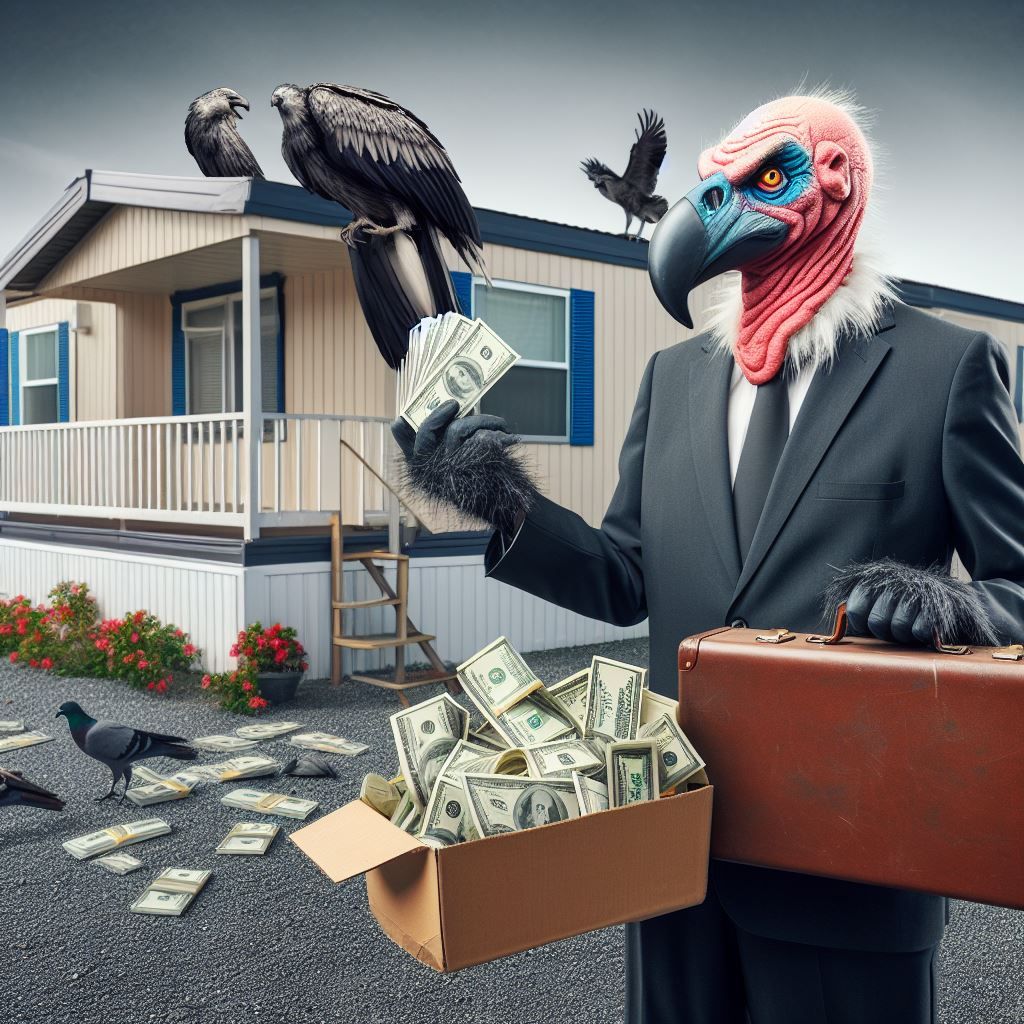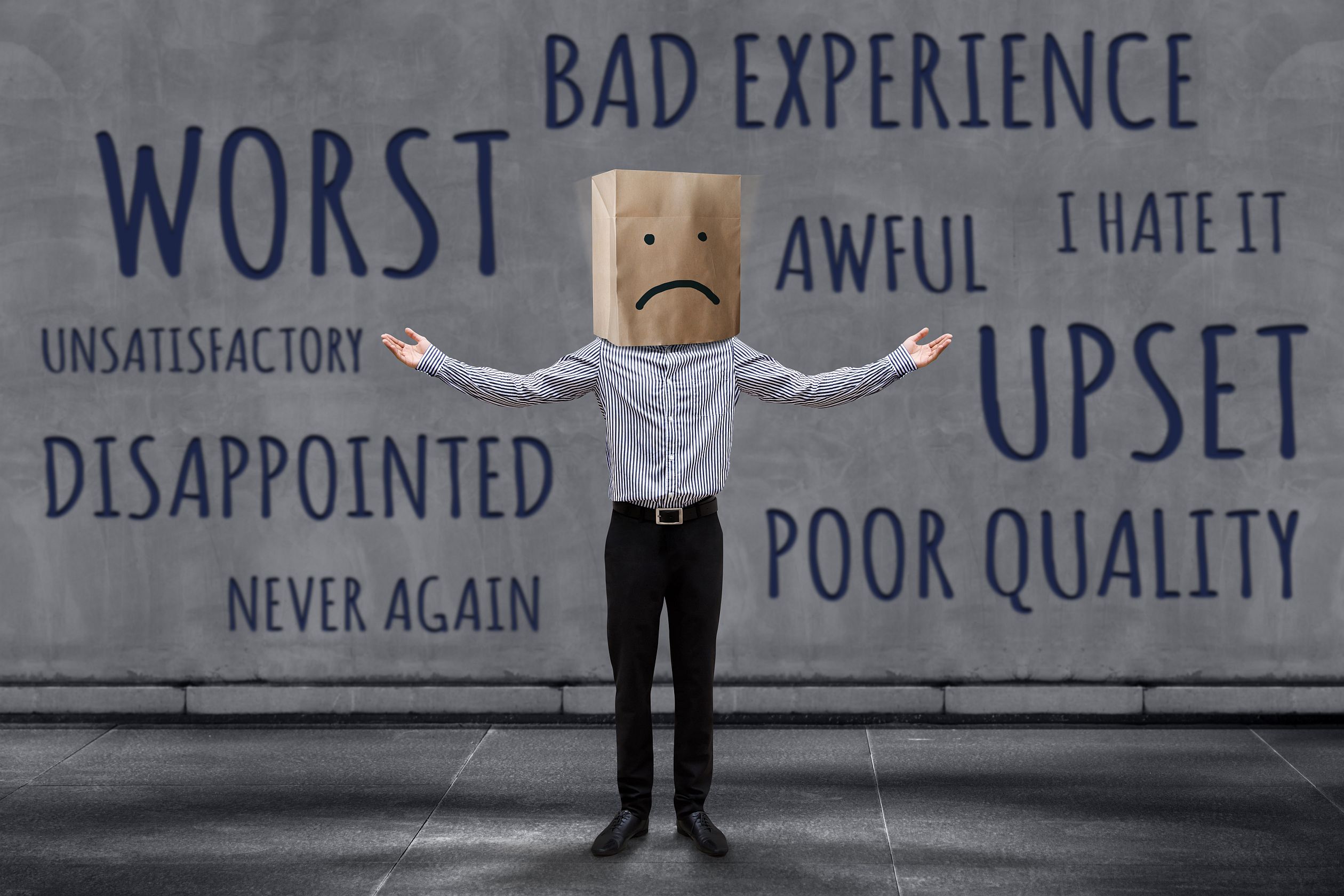Living in Mom-and-Pop Owned Parks (Family) Compared to Large Corporate-Owned Parks
As these family-owned parks began to be sold, Wall Street and big-money investors began to see an “asymmetry” that could be made more profitable. The homes were locked into the park, making the owners captive customers who could be forced to accept unfortunate changes. Residents discovered they had few consumer protections, and, to escape rising costs, they would need to sell their homes and leave the park to free themselves from increasing rent obligations.
Mobile Home Owners are Stakeholders Without a Voice
Who sets up and enables the mobile home park industry? The professional landlords, sales agents and lenders can move poorly-informed customers into parks, for profit. They encourage their customers to make a major investment in a building that is permanently tied to someone else’s land, with potentially snowballing fees attached. Few mobile home owners fully understand the implications of the agreements they sign and these industry professionals don’t fully divulge the potential risks.
We need better consumer information and protection. Loss of shelter and financial security is a risk that should be fully disclosed and addressed. We live in a civil society that requires more warnings on a bottle of aspirin than on a mobile home park lot rental agreement.
Collectively, manufactured mobile homeowners become major investors in the park when they purchase their homes. They create the park community, the customer base and the business, as much, or more than the landlord does. Additionally they must spend on insurance and maintenance of their houses and rental lots. It would be different if they didn’t have to buy their houses and spend on upkeep. By comparison, rent-payers in typical apartments aren’t required to participate in owning and maintaining the buildings.
There are a few park landlords who actually own the homes themselves and offer the entire package for rent – both the home and its grounds (the lot). This rare, full-rental home type of mobile home park resembles the rental business for site-built houses or cottage apartments and is much easier to understand, but harder to find. In this business model, the expenses of home ownership fall upon the landlord, not his customer.
In contrast, typical mobile home park residents are land renters who provide over 90% of the park structures at their own expense – homes that are effectively permanent parts of the park owner’s land.
When homeowners pay to own over 90% of the park structures, they provide the most desirable and valuable part of the park – the actual park buildings – the homes. It’s an unequal situation because the homes are effectively locked to the landlord’s land, making them behave like a landlord’s asset. Yet the residents must spend to buy and maintain them, as if their homes were entirely free property, unencumbered.
These conditions make mobile homeowners into financial stakeholders and value creators – a condition that does not exist with apartment rental. Being major investors, they deserve a seat at the table when important decisions are made about the business they support. But they are prevented from participating in major decisions and may not be given sufficient warning of important changes.
As the old saying goes, “If you are not at the table, you may be on the menu”. When all else fails and the homeowners try to establish regulation to have a voice about their investment, they may face a vicious fight against a well-funded professional opposition.
Some large corporate buyers, perceiving these conditions as exploitable, had a different idea about the park business than the original founders – that of massive profits via rent raises and continual acquisition of more parks. In contrast to the local mom-and-pop merchants, these large corporate aggregators impose a different business model that is making for bad news, according to some homeowners. Here is a link to a more detailed overview of this business model – which some may find disturbing.
The Large Mobile Homes Become a Financial Trap
Some mobile homeowners report feelings of being trapped because their homes are permanently attached to the park while land rent continues to jump. Often, the only expedient solution to escape the ever-rising rent is to attempt to sell the home and move out of the park.
Homeowners would increasingly see their homes losing value as the continual rent raises make the park more expensive and less desirable. Buyers can be attracted by lowering the total cost but the only way to lower cost is upon the shoulders of the home seller – by cutting the asking price of his mobile home.
To entice home buyers under such high rent conditions, a home seller will keep lowering his asking price. This can result in lost equity and an underwater mortgage. Some mortgage lenders may not lend in parks where egregious rent raises cause instability, further reducing competitive options needed to sell the home.
Do Public Financing and Tax Breaks Fuel High Profit Park Aggregation?
The number of mobile home parks under the control of large privately-owned aggregators is increasing. There are a few large park landlord companies that are publicly traded on the national stock exchanges but private equity holds an increasingly large segment of the aggregated parks.
Some of the large corporate park aggregators may get financing supported by quasi-government agencies (Government-sponsored enterprises AKA GSO’s). Other large aggressive park aggregators may be financed in part by pension funds.
Some observers question the negative effect of rising rents upon America’s affordable housing stock and the role the government and pension funds may be playing to amplify this impact. Various reports of protests against corporate aggregator landlords are becoming common – yet the high-profit park aggregator business model appears to be expanding.
Some private equity owners are accused of cutting staff, maintenance and services to further enhance the bottom line. With such business practices, landlords can speed up the recovery of the high prices they paid to get the park. The increased revenue may support more financing to buy more parks in what is known as a roll-up business model.
Real estate is considered a tax haven by some experts. Again, do government policies support businesses that can exploit seekers of affordable housing?
Residents Get Confused About Who Owns the Park
You may not get to meet the beneficial owners of these large corporate park aggregations, much less talk directly to them. They usually send employees out to talk to you, if at all. The employee may be able to make some decisions on the spot, but sometimes they have to follow orders from the landlord.
Some landlords hire management companies to tend to their park. This, and other strategies can give park owners a financial edge. Park residents may mistake these professional management companies for the landlords but they usually are not the actual park owners.
However, the park management companies may be related to the park owners or even a separate company owned by the landlords. As mobile home parks become financialized, it may be more difficult to define who is a beneficial park owner. Some parks aggregations appear to be wholly owned by tycoons (via corporate shells) while other aggregators share their profits, distributing them among investors.
– The Effects of the Corporate Aggregator Business Model –
Financial Gentrification of Parks
Retirees on fixed income and lower-income residents who sought affordable housing in a mobile home park may find themselves squeezed by ever-increasing rents. Significant rent regulation or lease negotiation options usually don’t exist. In California, for example, there are over 400 cities and jurisdictions but only 100 or so of them have rent protections in place for mobile home parks. Some states may have bans on rent regulation.
To solve their financial conundrum, homeowners may attempt to leave the park by selling the very home they once thought had solved their housing need. The higher cost of living in the park (mortgage plus increasing rent) may force financially squeezed homeowners to continually lower their asking prices to make the overall package (mortgage plus rent) more affordable to prospective buyers.
Once the original residents are forced out of the park due to high rent levels, the park becomes “gentrified”, and only those with higher incomes can afford the ever-rising rents. When home prices have fallen due to higher rent, unaware buyers may be attracted to the low price, especially if the park owner and sales agent are offering temporary rent discounts to encourage filling the park to capacity. But, as rents continue rising, it may only be a few short years before these recent buyers also feel trapped.
Long-term, ever-higher rents may reduce a homeowner’s available cash for home repairs and maintenance which lowers the quality and appearance of the park and the longevity, health and safety of the home. A park may be reduced to a slum with ever-higher rents and landlord neglect.
However, some parks have Rules and Regulations requiring homeowners maintain aesthetic standards and repair homes where needed – at the homeowner’s expense. Even though a homeowner, due to higher rent, may not afford these extra costs, he may be evicted** from the park for repeated violation of these requirements – too often enforced at the landlord’s discretion.
**Californa civil code 798.56. Failure of the homeowner or resident to comply with a reasonable rule or regulation of the park that is part of the rental agreement or any amendment thereto.
In Part 4, park residents push back against stigma, ignorance and unfair treatment.
Parks first served travelers with towable trailers. But the fundamentals changed to permanent residents in permanent houses that were too big to move.
Dramatic changes: Trailers become small houses; parks become settled housing tracts; residents become permanent, tax-paying citizens. But the old laws and thinking remain – holding back progress.
The park founders sell to large profit-seeking corporations that dramatically change the quality of life and stability of the manufactured housing tracts.
Homeowners and cities seek good solutions. Manufactured Home Parks provide good solutions—when not held back or exploited





